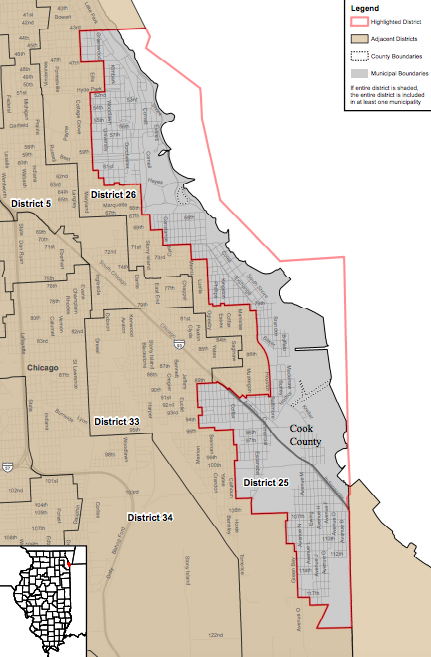“UChicago has been a leader in intellectual pursuits, academic research, basically thought leadership. As an anchor institution in the area, UChicago needs to invest in the community in a more direct way,” said Grace Chan McKibben, one out of seven Democratic candidates vying for Illinois 25th District state house seat.
Current 25th District State Representative and majority leader Barbara Flynn Currie is retiring after thirty-nine years in office, leaving the race for State Representative wide open. On the March 20 primary elections, voters will choose between McKibben and six other Democratic candidates to represent the district that includes areas of Hyde Park and neighborhoods on south down the lakefront.
McKibben said that she stands out because she is an immigrant Asian-American woman, a demographic barely represented in government. There has so far only been one Asian-American in the Illinois legislature: Theresa Mah (A.M. ’93, Ph.D. ’99), another ex-UChicago administrator elected just two years earlier. McKibben noted that she also has extensive experience in both the private and public sector. After receiving her A.B. and A.M. from the University of Chicago, McKibben served as Associate Dean of Students at UChicago from 1998 to 2003. She has also worked in government, as Chief of Staff of the Illinois Department of Employment Security from 2003 to 2005, and now works as a community leader, as Development Director at the Indo-American Center.
McKibben sat down with the Maroon to discuss her positions on UChicago’s influence in the local Hyde Park and Woodlawn communities.
Hyde Park Commercial Development
UChicago has long been criticized for driving up rents and forcing Hyde Park residents out of the neighborhood with its continuous commercial development on East 53rd street. Critics also fear that UChicago’s plans to build a new dorm on 61st street will draw in commercial activity south of the Midway and further drive up rents.
“UChicago is too corporate now, as opposed to when it was before when I was working there [as Associate Dean of Students],” said McKibben. With the 53rd street development, UChicago has “invested a lot in bringing in businesses that are from downtown or North Side neighborhoods, and as a result has been pushing out small businesses.” She cited the example of Sugarly, a candy store on 53rd street that recently closed.
“I was talking to the owner—her rent is $2,400 for a 600-square-foot store. It’s unbelievable.”
UChicago “needs to balance corporate business interests with community-based interests,” she said, by “reaching out to local organizations that support small business.”
McKibben said that on her end, she would address rising rents as one of her main priorities. She plans to introduce a comprehensive package that includes rent control and stabilization and a tenant support unit, to protect renters in Hyde Park and other developing neighborhoods in the 25th district.
Obama Presidential Center
Many Woodlawn residents have ardently protested UChicago’s partnership with the Obama Foundation in building the Obama Presidential Center (OPC), the planned presidential library of Barack Obama that will be located in Jackson Park. The residents fear the increased tourism from the OPC will increase rents for them, without providing them benefits such as increased training and education opportunities.
“I’m all for having the OPC in this area, where the president made his early impact. I definitely support an opportunity to bring in economic development,” McKibben said. “It’s just, needing to make sure that the community can benefit from the development.”
McKibben wrote in a blog post on her website that she would not support state funding for the OPC without a Community Benefits Agreement (CBA), a legally binding agreement signed by real estate developers and community groups affected by the development. In 2017, community groups came together to form the Obama Library South Side Community Benefits Agreement Coalition, asking for the Obama Foundation, UChicago, and the city of Chicago to sign a CBA. However, the developers have refused to sign one.
According to McKibben’s blog post, she believes that a CBA should detail “procedures on local hiring, living wage, and the use of neighborhood contractors,” as well as “a comprehensive plan bringing together all the proposed enhancements to Jackson Park.”
McKibben explained in the interview that community groups in Jackson Park are facing developments other than just the OPC; they are also dealing with a new golf course, the renovation of Osaka Garden, and other developments that continue to crop up.
“There hasn’t been one comprehensive plan for the future of Jackson Park,” she said, and so “different community groups are forced to do things piecemeal and to react in a reactive way.”
“If the officials can present a unified plan, there is more of an opportunity to talk about everything together…then the community can also respond in a cohesive and coordinated way.”
UChicago Police Department
Another issue related to the University that could come before the state legislature is the University’s large private police department. Though its officers have full police powers, it is not subject to public disclosure laws that govern public departments. The University releases some information about its operations voluntarily.
In February 2015, Illinois State Representatives Barbara Flynn Curry and Christian Mitchell proposed Bill HB3932, which would have required police departments at private universities to release the same information that public law enforcement agencies are required to release under the Freedom of Information Act (FOIA). The bill was not passed.
McKibben said that she “would be supportive” of a bill that subjects the UCPD to FOIA. The UCPD should have the same responsibility as the Chicago Police Department she said, “because, really, the UCPD is responsible for crime prevention in a patrol area that is not just the University.”
Charter Schools
Another one of McKibben’s main priorities is to protect neighborhood public schools. She supports a freeze on the number of charter schools until existing public schools are properly funded. In light of UChicago operating four charter school campuses and having just moved one campus south to 63rd street, the Maroon asked for McKibben’s comment on UChicago’s charter schools.
“Public school funding should be prioritized for neighborhood schools,” she said. “There is a place for charters if they offer programs not offered in neighborhood schools.” She cited an example being Chicago High School for the Arts (ChiArts), which offers academic classes in the morning and arts classes in the afternoon – a curriculum that neighborhood schools can’t provide. If the charter school does not offer unique programs, then it is just “taking resources and taking student population away from neighborhood schools.”
“From viewing [UChicago Charter School’s] website,” McKibben said, “I do not see that they offer specialized programs not found in CPS schools, in the same way as ChiArts does.”
Thought Leadership
McKibben states on her website that “Silicon Valley was made possible by Stanford, while the Massachusetts miracle of the 1980s… was possible because of MIT.” She further explained to the Maroon that Stanford and MIT are “leaders in leading technological advancement.”
“Here in the Midwest, there is potential for a tech boom and universities such as UChicago could lead that.”
McKibben cited the planned Harper Court Phase II development, a 280,000-square foot development with a 20-story office tower and laboratory that will aim to “create solutions to some of the world’s most difficult problems, from producing clean water to treating cancer,” according to the Harper Court website. This development is a partnership with the University of Illinois at Urbana-Champaign (UIUC) and the U.S. Army Research Laboratory (ARL), and is slated to break ground in 2018.
McKibben hopes that UChicago will takes this opportunity “to be a leader to advance not just those organizations’ [UIUC and ARLS’s] interests, but also those of community organizations,” such as those that are providing educational science and technology programs for public schools.
“In previous decades, there have been criticisms that the University tends to take care of its own people and exclude residents in the community…[but] if the University is more intentional about bringing community organizations in, this [Harper Court Phase II] could be a good opportunity.”
UChicago has “immense” resources compared to neighborhoods organizations, she said. “It would be great if UChicago could share its resources.”










